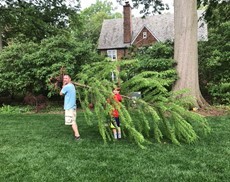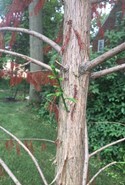The vinedresser refused to give up on his unfruitful tree. He put himself between it and the judgment it deserved, serving as mediator and caretaker.
Two years ago, my son and I transplanted a bald cypress in our back yard. It was already mature when we dug it up; about fifteen feet tall. For several weeks after the move, the tree looked great. Its needles were plush and green. Its perfect shape pointed tall and proud. We admired it each evening from our patio. But before long, the needles began to change color, from green to yellow to brown. The branches grew brittle. The tips began to curl. Slowly but surely, the tree became a shadow of itself (and an embarrassment to my wife). Summer arrived and we left town for vacation. I did not even bother asking anyone to water it. We agreed to cut it down for the bonfire after we returned.

Much to my surprise, we came back from vacation and noticed a few faint signs of life. A tiny green shoot, not much bigger than a pin head, had popped out at the base of the trunk. On closer inspection, it was not alone. It had four or five comrades. My hope was rekindled. It might just make it after all! Throughout the rest of the summer and into the fall and winter, I recommitted myself to tending and nurturing it. The tiny shoots (sparse as they were) stretched out a few inches. I checked it each morning and evening, eager to see (and report to my wife) its growth.

But the recovery was limited. Summer rolled around again, and the new branches were not much. The perfect shape was long gone. It was alive, to be sure, but it remained an embarrassment. Imagine a sickly version of Charlie Brown’s Christmas tree. This past fall I was tempted to put it out of its misery and get something new from the nursery. But I could not quite pull the trigger. We had been through a lot with that tree. One more year, I thought, one more winter of water and fertilizer and tender loving care. One more year to see if it can recover.
That is where it stands right now. I continue to care for it through these winter months. Optimism is not the right word, but I do have a little hope. If it comes out any better this spring, well and good! If not? Well, the bonfire waits. I guess we will see.
My saga with the transplanted bald cypress in our backyard makes me empathize with the vinedresser of Jesus’ parable in this text. Jesus tells a story about a tree which was not healthy. It was not bearing fruit. For three years it failed to do its job, and there was little reason to think the next year would be any different. But the vinedresser was not ready to give up. One more year, he asked, one more chance.
That is how the parable ends: Without resolution. Like the latest episode of the series you are streaming on Netflix, Jesus leaves us hanging. Does the tree improve? Does the owner of the vineyard even grant the vinedresser another year? Or does the tree finally get the ax? Jesus does not say. Perhaps that is the point.
Does the tree improve? Does the owner of the vineyard even grant the vinedresser another year? Or does the tree finally get the ax? Jesus does not say. Perhaps that is the point.
In his commentary on this text, Joel Green notes how this parable has a double purpose. It warns against unfruitfulness and it “dramatizes hope” (The Gospel of Luke, NICNT, 515). The warning is obvious. God’s expectations of a fruitful life are a recurring theme in the Gospel of Luke (3:7-9, 6:43-45, and 8:5-15). True repentance involves more than momentary feelings of sorrow or guilt. It also involves faith in God’s promises, which always leads to a fruitful life of love toward others. For the Lutheran understanding of repentance and the fruit that follows, see AC XII and XX. Also note the Epitome of the Formula of Concord III.11:
“[A]fter a person has been justified by faith, there then exists a true, living ‘faith working through love’ (Galatians 5). That means good works always follow justifying faith and are certainly found with it, when it is a true and living faith. For faith is never alone but is always accompanied by love and hope.”
As the saying goes, we are saved through faith alone. But genuine faith is never alone.
This is the warning. For Christians whose works of love are lacking, this parable puts them on notice. That is what Jesus is doing in the first five verses of our text. He teaches us to see every instance of suffering as a call to repentance. Not because He repays sins tit for tat, but because judgment is coming. All creation is fallen, and all creation will be held accountable. Contemporary examples of tragedy abound.
But the warning in this parable is overshadowed by the hope it dramatizes. Your sermon might dramatize that hope, too. Hence my story about the bald cypress. I have been through a lot with that tree. I want it to live, to thrive, to add to the beauty of this little corner of God’s creation. So, I will not give up on it. I will continue to reach out with love, fertilizer, and plenty of water. It probably will never be the perfect shape again, but there is life in it. And where there is life, there is hope.
The vinedresser refused to give up on his unfruitful tree. He put himself between it and the judgment it deserved, serving as mediator and caretaker. He promised to nurture it, and to help it bear fruit. This is what God does for us through His Son and His Spirit. God addresses our unfruitfulness with mercy and forgiveness in Christ. He sends you, as a preacher of the Gospel, to proclaim His promise of patience and forgiveness. This gospel promise nourishes and enlivens the people to whom you preach. It renews their faith in Jesus, and it sends them forth to live in love toward others.
What kind of fruit might that lead your hearers to bear? Of course, it depends on their vocations and your context. But if you would like to provide some direction, perhaps you will encourage them to love as patiently as the vinedresser loved that fig tree.
--------
Additional Resources:
Concordia Theology-Various helps from Concordia Seminary in St. Louis, MO to assist you in preaching Luke 13:1-9.
Text Week-A treasury of resources from various traditions to help you preach Luke 13:1-9.
Lectionary Podcast-Dr. David Scaer of Concordia Theological Seminary in Ft. Wayne, IN walks us through Luke 13:1-9.





